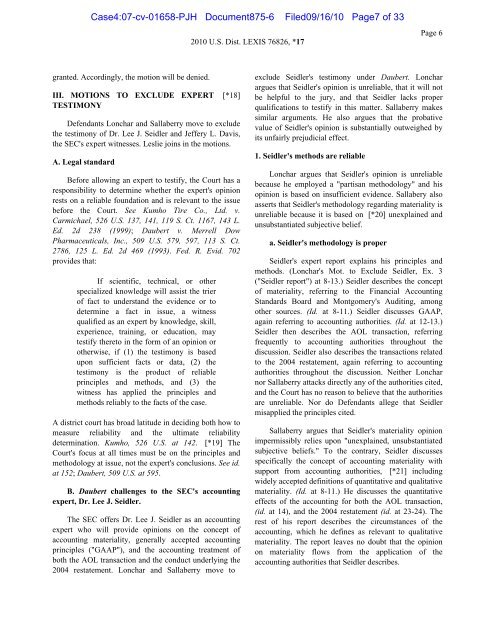exhibit 2 - SAP Lawsuit Portal
exhibit 2 - SAP Lawsuit Portal
exhibit 2 - SAP Lawsuit Portal
Create successful ePaper yourself
Turn your PDF publications into a flip-book with our unique Google optimized e-Paper software.
granted. Accordingly, the motion will be denied.<br />
III. MOTIONS TO EXCLUDE EXPERT [*18]<br />
TESTIMONY<br />
Defendants Lonchar and Sallaberry move to exclude<br />
the testimony of Dr. Lee J. Seidler and Jeffery L. Davis,<br />
the SEC's expert witnesses. Leslie joins in the motions.<br />
A. Legal standard<br />
Case4:07-cv-01658-PJH Document875-6 Filed09/16/10 Page7 of 33<br />
Before allowing an expert to testify, the Court has a<br />
responsibility to determine whether the expert's opinion<br />
rests on a reliable foundation and is relevant to the issue<br />
before the Court. See Kumho Tire Co., Ltd. v.<br />
Carmichael, 526 U.S. 137, 141, 119 S. Ct. 1167, 143 L.<br />
Ed. 2d 238 (1999); Daubert v. Merrell Dow<br />
Pharmaceuticals, Inc., 509 U.S. 579, 597, 113 S. Ct.<br />
2786, 125 L. Ed. 2d 469 (1993). Fed. R. Evid. 702<br />
provides that:<br />
If scientific, technical, or other<br />
specialized knowledge will assist the trier<br />
of fact to understand the evidence or to<br />
determine a fact in issue, a witness<br />
qualified as an expert by knowledge, skill,<br />
experience, training, or education, may<br />
testify thereto in the form of an opinion or<br />
otherwise, if (1) the testimony is based<br />
upon sufficient facts or data, (2) the<br />
testimony is the product of reliable<br />
principles and methods, and (3) the<br />
witness has applied the principles and<br />
methods reliably to the facts of the case.<br />
A district court has broad latitude in deciding both how to<br />
measure reliability and the ultimate reliability<br />
determination. Kumho, 526 U.S. at 142. [*19] The<br />
Court's focus at all times must be on the principles and<br />
methodology at issue, not the expert's conclusions. See id.<br />
at 152; Daubert, 509 U.S. at 595.<br />
B. Daubert challenges to the SEC's accounting<br />
expert, Dr. Lee J. Seidler.<br />
The SEC offers Dr. Lee J. Seidler as an accounting<br />
expert who will provide opinions on the concept of<br />
accounting materiality, generally accepted accounting<br />
principles ("GAAP"), and the accounting treatment of<br />
both the AOL transaction and the conduct underlying the<br />
2004 restatement. Lonchar and Sallaberry move to<br />
2010 U.S. Dist. LEXIS 76826, *17<br />
exclude Seidler's testimony under Daubert. Lonchar<br />
argues that Seidler's opinion is unreliable, that it will not<br />
be helpful to the jury, and that Seidler lacks proper<br />
qualifications to testify in this matter. Sallaberry makes<br />
similar arguments. He also argues that the probative<br />
value of Seidler's opinion is substantially outweighed by<br />
its unfairly prejudicial effect.<br />
1. Seidler's methods are reliable<br />
Lonchar argues that Seidler's opinion is unreliable<br />
because he employed a "partisan methodology" and his<br />
opinion is based on insufficient evidence. Sallabery also<br />
asserts that Seidler's methodology regarding materiality is<br />
unreliable because it is based on [*20] unexplained and<br />
unsubstantiated subjective belief.<br />
a. Seidler's methodology is proper<br />
Page 6<br />
Seidler's expert report explains his principles and<br />
methods. (Lonchar's Mot. to Exclude Seidler, Ex. 3<br />
("Seidler report") at 8-13.) Seidler describes the concept<br />
of materiality, referring to the Financial Accounting<br />
Standards Board and Montgomery's Auditing, among<br />
other sources. (Id. at 8-11.) Seidler discusses GAAP,<br />
again referring to accounting authorities. (Id. at 12-13.)<br />
Seidler then describes the AOL transaction, referring<br />
frequently to accounting authorities throughout the<br />
discussion. Seidler also describes the transactions related<br />
to the 2004 restatement, again referring to accounting<br />
authorities throughout the discussion. Neither Lonchar<br />
nor Sallaberry attacks directly any of the authorities cited,<br />
and the Court has no reason to believe that the authorities<br />
are unreliable. Nor do Defendants allege that Seidler<br />
misapplied the principles cited.<br />
Sallaberry argues that Seidler's materiality opinion<br />
impermissibly relies upon "unexplained, unsubstantiated<br />
subjective beliefs." To the contrary, Seidler discusses<br />
specifically the concept of accounting materiality with<br />
support from accounting authorities, [*21] including<br />
widely accepted definitions of quantitative and qualitative<br />
materiality. (Id. at 8-11.) He discusses the quantitative<br />
effects of the accounting for both the AOL transaction,<br />
(id. at 14), and the 2004 restatement (id. at 23-24). The<br />
rest of his report describes the circumstances of the<br />
accounting, which he defines as relevant to qualitative<br />
materiality. The report leaves no doubt that the opinion<br />
on materiality flows from the application of the<br />
accounting authorities that Seidler describes.


